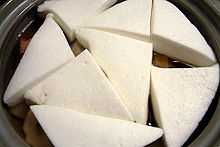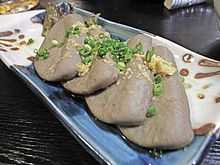Hanpen
From Wikipedia, the free encyclopedia

Hanpen

Kuro Hanpen (黒はんぺん), literally "black hanpen".
Hanpen (半片) is a white, square, triangle or round shaped surimi product with a soft, mild taste. It is believed to have been invented during the Edo period in Japan by a chef, Hanpei (半平) of Suruga, and the dish is named after him.[1] Another theory suggests that because it is triangle shaped and appears to have been cut in half from a square, it is a half (半 han) piece (片 pen). It can be eaten as an ingredient in oden or soup. It can also be fried or broiled.
In Shizuoka Prefecture, whole sardines are used and the resulting product has a bluish-gray color. This is called Kuro Hanpen (黒はんぺん), literally "black hanpen".
Hanpen is made from grated-Japanese mountain yam, surimied-Alaska pollock, salt, seaweed-stock (Kombu-Dashi).
See also
-
 Food portal
Food portal
References
- ↑ Origin of hanpen:Kibun foods, Japanese food company
This article is issued from Wikipedia. The text is available under the Creative Commons Attribution/Share Alike; additional terms may apply for the media files.